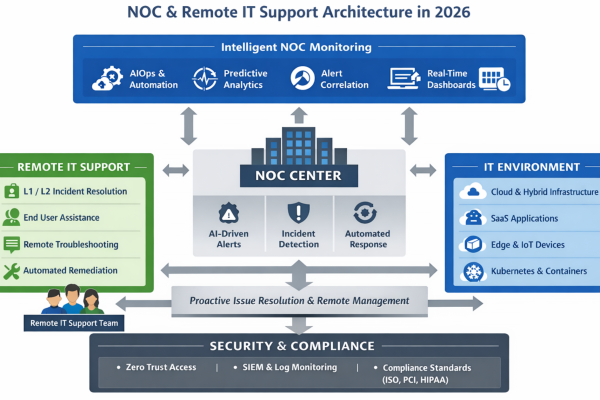How Do NOC Service Providers Enhance Network Security?
In today’s digital age, where businesses rely heavily on networks for their operations, ensuring network security is of utmost importance. Network security involves protecting the integrity, confidentiality, and availability of data and resources. A critical player in achieving this goal is the Network Operations Center (NOC). NOC service providers in Mohali play a pivotal role in maintaining and enhancing network security, ensuring that businesses can operate smoothly without the threat of cyber-attacks or network failures. This blog will explore how NOC service providers enhance network security, delving into the various strategies and tools they use.
Introduction to NOC Service Providers
NOC service providers are specialized teams or organizations that monitor, manage, and maintain the network infrastructure of businesses. These providers operate from a centralized location, known as the Network Operations Center, where they monitor network performance, detect and respond to potential threats, and ensure that all network components are functioning optimally. The primary goal of NOC service providers is to keep the network up and running, minimize downtime, and enhance network security.
The Importance of Network Security
Before diving into the specifics of how NOC service providers enhance network security, it’s essential to understand why network security is so critical. Network security involves safeguarding a computer network from unauthorized access, whether from deliberate attackers or opportunistic malware. It involves a combination of hardware, software, policies, and procedures to prevent unauthorized access, misuse, modification, or denial of the network and its resources.
Inadequate network security can lead to severe consequences, including data breaches, financial losses, reputational damage, and legal liabilities. As cyber threats become increasingly sophisticated, businesses need robust network security measures to protect their sensitive information and ensure business continuity.
How NOC Service Providers Enhance Network Security
NOC service providers enhance network security through a variety of strategies and tools designed to protect, monitor, and respond to potential threats. Below are some of the key ways in which NOC service providers contribute to a secure network environment.
1. 24/7 Network Monitoring
One of the most critical functions of NOC service providers is 24/7 network monitoring. By continuously monitoring the network, NOC service providers can detect and respond to security threats in real time. This proactive approach allows them to identify unusual activities, such as unauthorized access attempts or malware infections before they can cause significant harm.
Continuous monitoring also enables NOC service providers to track network performance and identify potential vulnerabilities that could be exploited by attackers. By addressing these vulnerabilities promptly, they help prevent security breaches and ensure the network remains secure.
2. Incident Response and Management
When a security incident occurs, a quick and effective response is crucial to minimize damage. NOC service providers are equipped with the tools and expertise to respond to security incidents promptly. They follow predefined incident response protocols to contain the threat, mitigate its impact, and restore normal network operations.
Incident management also includes investigating the root cause of the incident and implementing strategies to prevent similar occurrences in the future. NOC service providers work closely with IT teams to ensure that all security incidents are thoroughly investigated and that lessons learned are applied to enhance network security.
3. Vulnerability Management
Attackers can exploit vulnerabilities in network infrastructure to gain unauthorized access or disrupt network operations. NOC service providers play a crucial role in identifying and managing these vulnerabilities. They conduct regular vulnerability assessments and penetration testing to uncover weaknesses in the network.
Once vulnerabilities are identified, NOC service providers prioritize them based on their severity and potential impact. They then implement security patches, updates, and other remediation measures to address these vulnerabilities, reducing the risk of a security breach.
4. Threat Intelligence and Analysis
NOC service providers leverage threat intelligence to stay ahead of emerging cyber threats. Threat intelligence involves gathering and analyzing data on current and potential threats, including information on new malware, attack vectors, and hacking techniques. By staying informed about the latest threats, NOC service providers can implement proactive measures to protect the network.
Threat analysis also involves monitoring global threat trends and patterns. This information allows NOC service providers to anticipate potential attacks and take preventive actions to safeguard the network.
5. Security Policy Enforcement
NOC service providers play a vital role in enforcing security policies across the network. Security policies are a set of rules and guidelines that dictate how network resources should be used and protected. These policies may include access control measures, data encryption standards, and guidelines for secure communication.
By enforcing security policies, NOC service providers ensure that all network activities comply with best practices and regulatory requirements. They also monitor compliance with these policies and take corrective actions when violations occur, further enhancing network security.
6. Firewall and Intrusion Detection System (IDS) Management
Firewalls and Intrusion Detection Systems (IDS) are essential components of network security. Firewalls act as a barrier between the internal network and external threats, while IDS detects and alerts on suspicious activities that may indicate an ongoing attack.
NOC service providers manage these security tools to ensure they are configured correctly and functioning as intended. They monitor firewall and IDS logs for signs of potential threats and take immediate action to block or mitigate attacks. Regular updates and fine-tuning of these systems are also performed to adapt to new and evolving threats.
7. Network Configuration Management
Network configuration management is another critical aspect of network security. Misconfigurations in network devices, such as routers, switches, and servers, can create security vulnerabilities that attackers can exploit. NOC service providers ensure that all network configurations are secure and compliant with industry standards.
They also maintain detailed records of network configurations, allowing them to quickly identify and correct any misconfigurations that could compromise security. Regular audits and reviews of network configurations help prevent unauthorized changes and ensure that the network remains secure.
8. Patch Management
Keeping network devices and software up to date is essential for maintaining network security. NOC service providers are responsible for patch management, which involves applying security patches and updates to network devices, operating systems, and applications.
Patch management is crucial because it addresses known vulnerabilities that could be exploited by attackers. NOC service providers ensure that all patches are applied promptly, minimizing the risk of security breaches. They also test patches before deployment to ensure they do not cause any disruptions to network operations.
9. Data Encryption and Protection
Data encryption is a key component of network security, ensuring that sensitive information is protected from unauthorized access. NOC service providers implement encryption protocols to secure data both in transit and at rest. This means that even if data is intercepted by an attacker, it cannot be read without the appropriate decryption key.
In addition to encryption, NOC service providers implement other data protection measures, such as access controls and data loss prevention (DLP) tools. These measures protect sensitive information and help prevent data breaches.
10. Compliance with Security Standards
Many industries must adhere to regulatory requirements that mandate specific security measures. NOC service providers help businesses comply with these requirements by implementing and managing security controls that meet industry standards. For example, businesses in the healthcare sector may need to comply with the Health Insurance Portability and Accountability Act (HIPAA), which requires strict data protection measures.
By ensuring compliance with security standards, NOC service providers help businesses avoid legal penalties and protect their reputations. They also provide documentation and reporting to demonstrate compliance during audits and inspections.
Conclusion
In conclusion, NOC service providers play a vital role in enhancing network security through a comprehensive range of services, including 24/7 monitoring, incident response, vulnerability management, and threat intelligence. By leveraging advanced tools and expertise, they ensure that businesses can operate securely in an increasingly complex and threatening digital environment.
Author







